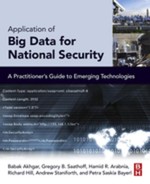About the Editors
Babak Akhgar is professor of informatics and director of the Centre of Excellence in Terrorism, Resilience, Intelligence and Organised Crime Research (CENTRIC) at Sheffield Hallam University, UK, and fellow of the British Computer Society. He has more than 100 refereed publications in international journals and conferences on information systems with a specific focus on knowledge management (KM). He is a member of editorial boards for several international journals and has acted as chair and program committee member for numerous international conferences. He has extensive and hands-on experience in the development, management, and execution of KM projects and large international security initiatives (e.g., the application of social media in crisis management, intelligence-based combating of terrorism and organized crime, gun crime, cybercrime and cyberterrorism, and cross-cultural ideology polarization). In addition to this, he is the technical lead of two EU Security projects: “Courage” on cybercrime and cyberterrorism and “Athena” on the application of social media and mobile devices in crisis management. He has coedited several books on intelligence management. His recent books are titled Strategic Intelligence Management, Knowledge Driven Frameworks for Combating Terrorism and Organised Crime, and Emerging Trends in ICT Security. Professor Akhgar is a member of the academic advisory board of SAS, UK.
Gregory Saathoff is a forensic psychiatrist who serves as a professor within the University of Virginia’s School of Medicine and is executive director of the University of Virginia’s Critical Incident Analysis Group (CIAG). CIAG serves as a “ThinkNet” that provides multidisciplinary expertise in developing strategies that can prevent or mitigate the effects of critical incidents, focusing on building relationships among leadership in government, academia, and the private sector for the enhancement of national security. He currently serves in the elected role of chairman of the General Faculty Council within the University of Virginia. Formerly a Major in the US Army, Dr Saathoff was appointed in 1996 to a U.S. Department of Justice commission charged with developing a methodology to enable the FBI to better access nongovernmental expertise during times of crisis, and has served as the FBI’s conflict resolution specialist since that time. From 2009–2011, he chaired the Expert Behavioral Analysis Panel on the Amerithrax Case, the largest investigation in FBI history. A consultant to the U.S. Department of Justice, Department of Defense, and Department of Homeland Security, he brings behavioral science subject matter expertise and leverages CIAG’s network of relationships to strengthen CENTRIC’s US-European connections among government and law enforcement entities. In addition to his faculty role at the University of Virginia, Dr Saathoff also holds the position of visiting professor in the Faculty of Arts, Computing, Engineering and Sciences at Sheffield Hallam University.
Hamid R. Arabnia is currently a full professor of computer science at University of Georgia (Georgia, USA). Dr Arabnia received a PhD degree in Computer Science from the University of Kent (Canterbury, England) in 1987. His research interests include parallel and distributed processing techniques and algorithms, supercomputing, big data analytics, and applications in medical imaging, knowledge engineering, security and surveillance systems, and other computational intensive problems. Dr Arabnia is editor-in-chief of The Journal of Supercomputing (Springer); Transactions of Computational Science and Computational Intelligence (Springer); and Emerging Trends in Computer Science and Applied Computing (Elsevier). He is also on the editorial and advisory boards of 28 other journals. Dr Arabnia is an elected fellow of International Society of Intelligent Biological Medicine (ISIBM). He has been a PI/Co-PI on $8M funded initiatives. During his tenure as graduate coordinator of computer science (2002–2009), he secured the largest level of funding in the history of the department for supporting the research and education of graduate students (PhD, MS). Most recently, he has been studying ways to promote legislation that would prevent cyberstalking, cyber harassment, and cyberbullying. Prof Arabnia is a member of CENTRIC advisory board.
Richard Hill is professor of intelligent systems and head of department in the School of Computing and Mathematics at the University of Derby, UK. Professor Hill has published over 150 peer-reviewed articles in the areas of multiagent systems, computational intelligence, intelligent cloud computing, and emerging technologies for distributed systems, and has organized a number of international conferences. Latterly, Professor Hill has edited and coauthored several book collections and textbooks, including Guide to Cloud Computing: Principles and Practice, published by Springer, UK.
Andrew Staniforth is a serving police detective inspector and former special branch detective. He has extensive operational experience across multiple counterterrorism disciplines, now specializing in security-themed research leading an innovative police research team at the Office of the Police and Crime Commissioner for West Yorkshire. As a professionally qualified teacher, Andrew has designed national counterterrorism exercise programs and supports the missions of the United Nations Terrorism Prevention Branch. Andrew is the author of Blackstone’s Counter-Terrorism Handbook (Oxford University Press, 2009, 2010, 2013), and Blackstone’s Handbook of Ports & Borders Security (Oxford University Press, 2013). Andrew is also the author of the Routledge Companion to UK Counter-Terrorism (Routledge, 2012) and coeditor of the Cyber Crime and Cyber Terrorism Investigators Handbook (Elsevier, 2014). Andrew is a senior research fellow at CENTRIC, and research fellow in Criminal Justice Studies at the University of Leeds School of Law.
Petra Saskia Bayerl is assistant professor of technology and organizational behavior at Rotterdam School of Management, Erasmus University, Netherlands and program director of technology at the Centre of Excellence in Public Safety Management (CESAM, Erasmus). Her current research lies at the intersection of human–computer interaction, organizational communication, and organizational change with a special focus on the impact of technological innovations and public safety. Over the past four years, she has been involved in two EU-funded security-related projects: COMPOSITE (comparative police studies in the EU) and CRISADMIN (critical infrastructures simulation of advanced models on interconnected networks resilience). She is also a visiting research fellow at CENTRIC, Sheffield Hallam University, UK.
..................Content has been hidden....................
You can't read the all page of ebook, please click here login for view all page.
